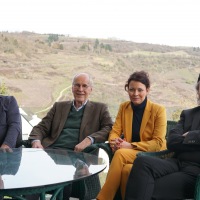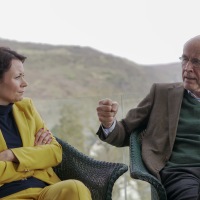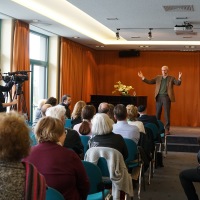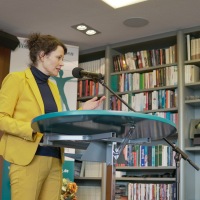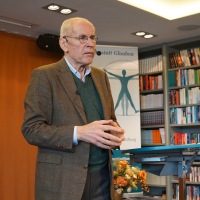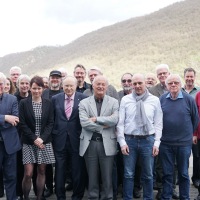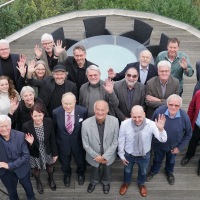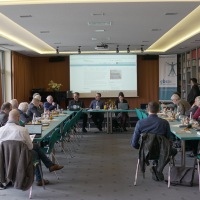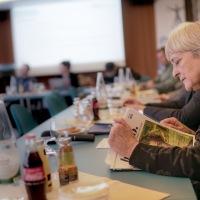"Ensure transparency and justice at last!"
Criminologist Pfeiffer demands the retrieval of the abuse files from the Vatican and comprehensive compensation

pfeiffer_gbs2020.jpg
Criminologist Christian Pfeiffer at the gbs foundation headquarters (Photo: F. Chefai)
Criminologist Professor Christian Pfeiffer has demanded that the federal government retrieve the abuse files from the Vatican, that the Bishops' Conference pay compensation also for life-long loss of earnings of abuse victims, and that independent research involving 5,000 active priests be permitted. Pfeiffer said this on March 8, 2020, at an event on the topic of "Religion and Violence" organized by the Institut für Weltanschauungsrecht (ifw - Institute for Secular Law) and the Giordano Bruno Foundation (gbs) in Haus Weitblick in Oberwesel.
Professor Christian Pfeiffer (author of the book "Gegen die Gewalt - Warum Liebe und Gerechtigkeit unsere besten Waffen sind", director of the Criminological Research Institute of Lower Saxony a.D. and former Minister of Justice of Lower Saxony a.D. of the Social Democratic Party) thus commented on the controversial results of the Spring Conference of German Bishops at the beginning of March. Affected persons had complained that the church only wants to pay damages for pain and suffering, based on the civil law tables for damages for pain and suffering. The damages for sexual abuse would amount to between 5,000 and 50,000 euros. Those involved in the Eckiger Tisch (a non-profit association that represents the interests of those affected by sexual violence against children and young people specifically in the context of the Catholic Church, TN) had recently criticized that aspects of "cover-up and concealment" by the perpetrator organization church would thus be ignored.
Compensation for life-long loss of earnings
In Pfeiffer's assessment, the exclusive payment of damages for pain and suffering is too little: "The protection and care of victims must be improved. The bishops must not close their minds to a civil court review. A claim for damages does not only include compensation for pain and suffering. If the bishops adhere to civil law regulations, then they should also compensate the loss of earnings of the abuse victims".
In the debate with ifw lawyers, the idea arose of conducting model cases in selected dioceses and having state courts decide on the amount of material and immaterial damage claims. Within the framework of this, the recognition of a loss of earnings, among other things, could be expected. If 1,000 Euro per month were to be applied, this would result in an amount of 360,000 Euro for 30 years of employment. This would undoubtedly justify the publicly raised claims of the affected persons for compensation payments per victim between 300,000 and 400,000 euros. In addition, an evaluation of the annual accounts of all dioceses had shown at the beginning of March 2020 that a compensation volume in the order of one billion euros could be paid.
If the church sought to orient itself towards claims for damages for pain and suffering that are common in state courts, it should waive the statute of limitations. Otherwise, this alleged recognition by state courts would become mere waste-paper. In the past, the enforcement of claims for damages by victims of abuse often failed because the claims were already statute-barred. With the possible objection of the statute of limitations the church cuts off most victims from going to the state courts and wants to be able to decide whether, when, and how much it pays to the victims. In short: "It wants to continue to be both party and judge in this dispute and thus continue exactly what it has been doing in the abuse cases of the past decades." (Pfeiffer)
The objection of the statute of limitations must, however, be actively raised by the church lawyers during the trial. According to Pfeiffer, the church should waive this objection. This would only be fair and decent. After all, the church had discouraged the victims in many ways over many years to assert their rights and thus played a decisive role in the fact that many abuse acts and the abuse system could be covered up. In proceedings under the Victims' Compensation Act (OEG), the state must also take greater care not to commission experts close to the church.
Retrieving abuse files from the Vatican
Federal Justice Minister Christine Lambrecht recently said on ZDF television: We will "use every opportunity to investigate" and the state knows "no secret archives". At the event, Pfeiffer took the Minister of Justice at her word: "Ensure transparency and justice at last! It is high time that the church secret archives in Germany are opened and the abuse files from the Vatican are brought back to Germany. This also includes the disclosure of internal church investigations, such as those carried out in the diocese of Munich and Freising. In Munich, a 350-page study about the diocese is in the safe deposit box of Cardinal Reinhard Marx. It is absurd when he makes his flaming speeches about transparency and to this day he is not afraid of anyone saying 'Open the safe!' There is no reason to protect Benedict or give him a special role just because he has become pope."
From Germany, thousands of files on abuse cases were also taken to the Vatican by the church. This was done by order of Joseph Ratzinger ("De delictis gravioribus - über schwere Verbrechen") even before he became Pope Benedict XVI. They have disappeared there to this day. Furthermore, hundreds of religious orders have their headquarters and personal archives in Rome.
The director of the ifw, Jacqueline Neumann, said at the event: "Where are the German requests for judicial assistance to the Vatican? Apparently not even a single request for judicial assistance has been made to the Vatican from Germany. Not even after six criminal law professors from our institute filed criminal charges in 2018 with the public prosecutor's offices at the headquarters of each diocese throughout Germany. The abuse files are, however, not only relevant for the criminal investigation, but also essential for the assertion of claims for damages against the churches and state liability claims against the federal and state governments".
Allowing independent research
In order to systematically work through the abuse system and prepare fundamental reforms, Pfeiffer also called on the bishops to finally make independent research possible: "There must be no more window-dressing as recently under Cardinal Marx. Independent research is needed. With the anonymous questioning of a random selection of about 5,000 active priests, especially on the extreme work overload of the priests, on clericalism, and the handling of celibacy, important insights can be gained for the prevention of abuse".

